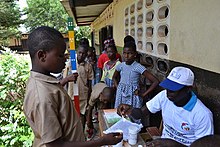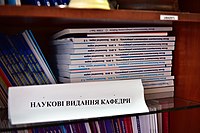Wikipedia talk:WikiProject Molecular Biology/Molecular and Cell Biology
|
WikiProject Molecular and Cell Biology
A community for editors of — molecular biology · cell biology · developmental biology · microbiology · biochemistry
|
WT:MCB
|
|
| WikiProject Molecular and Cellular Biology has been featured twice in the Signpost. If you wish to get involved with the Signpost, please visit the Newsroom. First report - 28 January 2008 Second report - 20 May 2015 |
Reclassification of Cyclopenenone prostaglandins
Would someone review the Cyclopentenone prostaglandins article for the purpose of reclassifying it? The article has recently been greatly expanded. Although it is categorized as a Pharmacy and Pharmacology article, it is better categorized in the Molecular and Cellular biology section. All of the prostaglandins are so categorized (e.g. see prostaglandin). Also, the article as currently formatted is correctly redirected from 15-deoxy-Δ12,14-prostaglandin J2 (15-d-Δ12,14-PGJ2), a principal cycloentenone prostaglandin. Is it possible to similarly redirect it from other cyclopenentone prostaglandins viz., Δ12-PGJ2, PGJ2, PGA2, and PGA1, discussed in the article (but not given separate Wikipedia pages elsewhere) and, if so, how do I do that? Thanks, (User talk:joflaher). 6 December 2016 (UTC)
Revisit figure of Illumina dye sequencing
Illumina sequencing is a very important method to know nowadays, as least for anyone working in molecular biotechnology. The figure for the creation of clusters is correct, but could use someone who puts in some love. It was obviously drawn quickly and I think the article deserves more.
https://en.wikipedia.org/wiki/Illumina_dye_sequencing
There are many nice resources to find inspirations, such as the Youtube channel of illumina.
Facto Post – Issue 2 – 13 July 2017
Issue 2 – 13 July 2017
| |
|---|---|
|
Facto Post – Issue 15 – 21 August 2018
Facto Post – Issue 15 – 21 August 2018

 To grasp the nettle, there are rare diseases, there are tropical diseases and then there are "neglected diseases". Evidently a rare enough disease is likely to be neglected, but neglected disease these days means a disease not rare, but tropical, and most often infectious or parasitic. Rare diseases as a group are dominated, in contrast, by genetic diseases. A major aspect of neglect is found in tracking drug discovery. Orphan drugs are those developed to treat rare diseases (rare enough not to have market-driven research), but there is some overlap in practice with the WHO's neglected diseases, where snakebite, a "neglected public health issue", is on the list. From an encyclopedic point of view, lack of research also may mean lack of high-quality references: the core medical literature differs from primary research, since it operates by aggregating trials. This bibliographic deficit clearly hinders Wikipedia's mission. The ScienceSource project is currently addressing this issue, on Wikidata. Its Wikidata focus list at WD:SSFL is trying to ensure that neglect does not turn into bias in its selection of science papers.
If you wish to receive no further issues of Facto Post, please remove your name from our mailing list. Alternatively, to opt out of all massmessage mailings, you may add Category:Wikipedians who opt out of message delivery to your user talk page.
Newsletter delivered by MediaWiki message delivery |
MediaWiki message delivery (talk) 13:23, 21 August 2018 (UTC)
Expert attention
This is a notice about Category:Molecular and Cell Biology articles needing expert attention, which might be of interest to your WikiProject. It will take a while before the category is populated. There might be as few as one page in the category, or zero if someone has removed the expert request tag from the page. — Mr. Guye (talk) (contribs) 22:31, 9 September 2018 (UTC)
- @Mr. Guye: Thanks! I've just also found two other categories. how easy would these be to merge?
- T.Shafee(Evo&Evo)talk 23:59, 9 September 2018 (UTC)
- @Evolution and evolvability: Probably not easy, but I really don't know. Maybe nominate them for merging at CfD, and ask for help there. — Mr. Guye (talk) (contribs) 00:04, 10 September 2018 (UTC)
Nonglobular Protein Taskforce
There was an editathon at the recent NGP-Net conference for nonglobular protein science, which is affiliated with a European consortium/scientific society. There was interest from the student network in sponsoring regular editathons and curating some pages from our topic area. Many of the pages that were identified as needing improvement are within the bounds of WP:MCB (or occasionally WP:WCB), so it would make sense organize within this project.
Some other projects have the concept of a task force (example) for organizing sub-communities with shared interests. Technically, this consists of a slightly modified banner on the talk page and a set of categories so that task force members can identify pages requiring improvement. Would this community be supportive of starting a task force relating to nonglobular proteins?
Example topics to include would be intrinsically disordered proteins, protein tandem repeats, amyloid, low-complexity_regions, and methods for investigating such topics.
-- Quantum7 07:17, 14 September 2018 (UTC)
- @Quantum7: Great news. Might it be worth running it on this talk page in stead of spinning off a taskforce (to reduce admin overhead)? A separate taskforce page could be later separated off if the discussion traffic becomes too overwhelming here. Either way, I'm happy to help out the venture in whatever way is most useful. I work in nonglobular proteins (cysteine-rich proteins and hydroxyproline-rich glycoproteins) which are both redlinks that have been in the back of my mind for a while. Several nonglobular protein superfamilies (e.g defensins) are also in a sorry state. T.Shafee(Evo&Evo)talk 13:41, 14 September 2018 (UTC)
Circulating mitochondrial DNA
I have just created a stub on circulating mitochondrial DNA, which is a topic with over 800 Google Scholar hits and a breathless writeup on September 13 in Scientific American. If anybody want to improve my terrible stub, please do. Abductive (reasoning) 20:34, 20 September 2018 (UTC)
Disambiguation links to Adhesin
Can anyone on this wikiproject help with the disambiguation links to Adhesin. It is a specialist topic and I don't have the expertise to fix the list here.— Rod talk 16:01, 26 September 2018 (UTC)
- I think that the dab page needs to be turned into a broad concept article. Jo-Jo Eumerus (talk, contributions) 16:42, 26 September 2018 (UTC)
Pyruvate kinase
The article on pyruvate kinase says that "In Archaean oceans, phospho-enolpyruvate may have been present abiotically." I doubt that phosphoenolpyruvate is stable in water. Wouldn't it hydrolyze immediately to phosphoric acid and pyruvic acid?? I didn't want to edit the article because I'm not sure of this but it sounds suspicious to me. This was the only place I could find to leave a comment. And I will sign my post with four tildes, if that's what you want.
The mark of the anonymous commenter: 169.229.232.53 (talk) 21:37, 26 September 2018 (UTC)
Facto Post – Issue 16 – 30 September 2018
Facto Post – Issue 16 – 30 September 2018

 In an ideal world ... no, bear with your editor for just a minute ... there would be a format for scientific publishing online that was as much a standard as SI units are for the content. Likewise cataloguing publications would not be onerous, because part of the process would be to generate uniform metadata. Without claiming it could be the mythical free lunch, it might be reasonably be argued that sandwiches can be packaged much alike and have barcodes, whatever the fillings. The best on offer, to stretch the metaphor, is the meal kit option, in the form of XML. Where scientific papers are delivered as XML downloads, you get all the ingredients ready to cook. But have to prepare the actual meal of slow food yourself. See Scholarly HTML for a recent pass at heading off XML with HTML, in other words in the native language of the Web. The argument from real life is a traditional mixture of frictional forces, vested interests, and the classic irony of the principle of unripe time. On the other hand, discoverability actually diminishes with the prolific progress of science publishing. No, it really doesn't scale. Wikimedia as movement can do something in such cases. We know from open access, we grok the Web, we have our own horse in the HTML race, we have Wikidata and WikiJournal, and we have the chops to act. 
If you wish to receive no further issues of Facto Post, please remove your name from our mailing list. Alternatively, to opt out of all massmessage mailings, you may add Category:Wikipedians who opt out of message delivery to your user talk page.
Newsletter delivered by MediaWiki message delivery |
MediaWiki message delivery (talk) 17:57, 30 September 2018 (UTC)
Removal of 3DMet data from {{Chembox}}
 3DMet ID (P2796) (see uses)
3DMet ID (P2796) (see uses)
At the moment, the article about 3DMet (one in the Category:Chemical databases (49)), is up for deletion (AfD). Reason is lack of WP:NOTABILITY, as measured by ~not being referenced in secondary (independent) sources. IOW, virtually no sources refer to it as useful etc. or actually use 3DMet.
If and when this article is deleted, it follows that the {{Chembox}} data row (|3DMet= in {{Chembox}}) should be removed too (we should not link or point to an irrelevant and not-notifyable database). Today, some 126 articles use parameter |3DMet=: [1].
Action needed: The only way to save this information is to prove notability of 3DMet by adding secondary sources (read the AfD though for an investigation already made into this: few sources are sound). -DePiep (talk) 07:23, 19 October 2018 (UTC)
- Huh? WP:N has nothing to do with infoboxes. That an article isn't notable by the particular definition used in notability policies does not mean it isn't useful in chemboxes. Jo-Jo Eumerus (talk, contributions) 14:07, 19 October 2018 (UTC)
- If the 3DMet database is not noteworthy in Wikipedia, then referring/linking to it is not noteworthy either. How can an irrelevant database be relevant in infoboxes? -DePiep (talk) 14:50, 19 October 2018 (UTC)
- Or, the other way around: if there is a useful application of 3DMet data in literature (for some compound), that would be a supporting reference for 3DMet. -DePiep (talk) 14:53, 19 October 2018 (UTC)
- "Relevant" in the sense of an infobox and "relevant" in the sense of WP:Notability are not the same thing at all. For example, if the database is frequently used by chemists but seldom discussed. Jo-Jo Eumerus (talk, contributions) 15:07, 19 October 2018 (UTC)
- Yes, that is the point: if its usage & virtues are not ending up in sources (publications), it is clearly not relevant. Not the database, not the application wrt a compound. If the database would add really something to some research issue, that creates relevance. In the end: Why have a redlink i.e. nonexistant "3DMet" in the lefthand side of {{Chembox}}, with data (ID) in righthandside? -DePiep (talk) 15:30, 19 October 2018 (UTC)
- Talk central is here. I'll reproduce/link your argument there shortly. -DePiep (talk) 19:48, 19 October 2018 (UTC)
- Yes, that is the point: if its usage & virtues are not ending up in sources (publications), it is clearly not relevant. Not the database, not the application wrt a compound. If the database would add really something to some research issue, that creates relevance. In the end: Why have a redlink i.e. nonexistant "3DMet" in the lefthand side of {{Chembox}}, with data (ID) in righthandside? -DePiep (talk) 15:30, 19 October 2018 (UTC)
- "Relevant" in the sense of an infobox and "relevant" in the sense of WP:Notability are not the same thing at all. For example, if the database is frequently used by chemists but seldom discussed. Jo-Jo Eumerus (talk, contributions) 15:07, 19 October 2018 (UTC)
Advice on new article: Ragulator-Rag complex
I just added a new article by my class (Ragluator-Rag complex) and was wondering what to do to get it noticed and properly indexed or catagorized.137.142.46.79 (talk) 19:38, 24 October 2018 (UTC)

